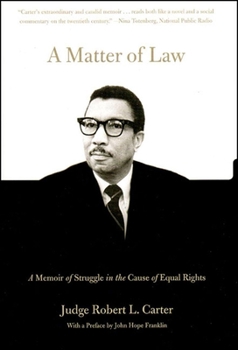A Matter of Law: A Memoir of Struggle in the Cause of Equal Rights
Select Format
Select Condition 
Book Overview
As chief legal assistant to Thurgood Marshall and, later, as General Counsel to the NAACP, Robert L. Carter played a central role in crafting the legal strategy for the pivotal cases of the civil rights era--arguing and winning over twenty pivotal cases before the Supreme Court, including Brown v. Board , with Thurgood Marshall. A Matter of Law is the extraordinary story of Carter's struggle for equal rights for all Americans. Carter's history with the NAACP during its pivotal years (1945-1968) is at the center of this memoir, which offers a rare personal account of how the legal campaign in Brown was mounted. In the aftermath of Brown , Carter turned his attention to broadening the application of Brown to challenge racial inequality in Northern schools. His account of the NAACP's efforts to expose the pervasive nature of school segregation in the North brings this history to the forefront for the first time--and is essential to any discussion of the limitations of the civil rights movement of the 1950s and 1960s. Carter's post-NAACP career enabled him to participate in and reflect on the fight for racial justice from a variety of vantage points, most recently as a federal district judge in New York. He brings a fresh and critical perspective to bear on the long-term consequences of the civil rights movement and the need for new and innovative approaches to the continuing struggle for racial justice in America.
Format:Hardcover
Language:English
ISBN:1565848306
ISBN13:9781565848306
Release Date:May 2005
Publisher:New Press
Length:256 Pages
Weight:1.10 lbs.
Dimensions:1.1" x 5.8" x 8.5"
Customer Reviews
2 ratings
how the civil rights battles were thought
Published by Thriftbooks.com User , 19 years ago
Judge Robert Carter gives a blow by blow account of the legal fronts of the civil rights struggle: the personalities involved, the infighting among them, the battles won, lost, and nearly neglected. Brown v. Board is well-told elsewhere, while other struggles receive overdue attention (e.g., the battle for the NAACP to preserve its member lists from scrutiny by officials striving to break the organization's back). Carter perceives himself as the uncharismatic technocrat of the struggle, an unheralded leader in a fight who was unceremoniously jettisoned from its core despite his impressive contributions. Accordingly, his account is that of a dutiful documentarian, rather than a labor of love, and the writing suffers for a dearth of passion.
A brief memoir
Published by Thriftbooks.com User , 19 years ago
When reading about the history of the NAACP's and the Legal Defense Fund's struggle for human rights, we tend to hear more about Thurgood Marshall and not enough about Robert Carter, who was a integral part of the fight. After many years, Robert Carter has shared his perspective with us. Tales from Carter's childhood and schooling are simply stated. Given the discrimination and hardship with which he grew up, these tales are more aptly labeled, "simply understated. His accomplishments through adversity are clearly laudable, but we don't get all the detail we would hope for. He does discuss a falling out between Marshall and him, and he also discusses grabs for power as Thurgood left. However, we don't get this level of detail on the cases. Regardless of the level of detail, this is a very informative read. I would recommend that anyone wanting to know more about our continuing struggle with civil rights should read this book.






